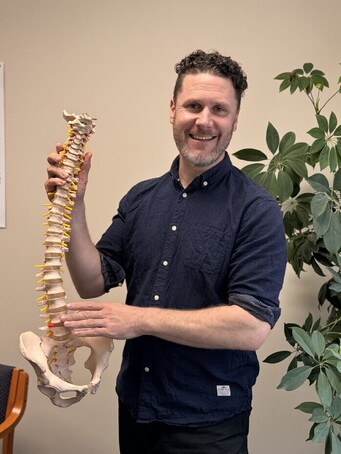Headaches can range from a mild nuisance to a debilitating condition that can seriously impact your quality of life. Whilst medication can provide some temporary relief, prolonged use can be potentially harmful to your health. Instead, having a deeper understanding of what might be causing your headaches can lead to more effective and sustainable solutions. Below are some simple yet effective ways to help manage your headaches, or avoid them altogether.
1. Practice Good Posture
Poor posture can contribute to headaches by straining the neck and upper back muscles and irritating the cervical spine in the neck. This can become an issue if you’re desk-bound for long periods, have a repetitive job or do a lot of driving. Maintaining good posture helps reduce muscle tension and improves overall spinal alignment.
● Ergonomic Workspace: Ensure your workstation or car is set up to support a neutral spine position. Your screen should be at eye level, and your chair should support your lower back.
● Regular Breaks: Take breaks to stretch and move every 30-60 minutes, especially if you spend long hours at a desk or behind the wheel of a car.
2. Stay Hydrated
Dehydration is a common trigger for headaches. Ensure you're drinking enough water throughout the day. Aim for at least 8 glasses (2 liters) daily, and adjust your intake based on your daily activity.
3. Manage your Stress Effectively
Stress is also a major contributor to headaches. Incorporating stress management strategies can help alleviate headache frequency and severity.
● Relaxation Techniques: Practice deep breathing, meditation, or progressive muscle relaxation to manage stress.
● Regular Exercise: Engage in regular physical activity, such as walking, yoga, or swimming, which can help reduce stress and muscle tension.
4. Optimise your Sleep
Inadequate or irregular sleep patterns are a significant trigger for headaches. Aim for 7-9 hours of quality sleep each night to help prevent headaches.
● Establish good sleep hygiene: Go to bed and wake up at the same time each day to regulate your sleep-wake cycle, and try to avoid exposure to screens and other sources of blue light at least an hour before bedtime.
● Create a Restful Environment: Keep your bedroom cool, dark, and quiet to improve sleep quality.
5. Monitor Your Diet
Certain foods and drinks can trigger headaches in some people, and can be a key factor in recurrent migraines. Keeping a headache diary can help you identify and avoid potential dietary triggers.
● Avoid Known Triggers: Common culprits include caffeine, alcohol, processed foods, and foods high in MSG or nitrates.
● Eat Balanced Meals: Incorporate a variety of fruits, vegetables, whole grains, and lean proteins into your diet to maintain stable blood sugar levels.
6. Consult with an Osteopath!
If headaches persist despite implementing these strategies, book yourself in for an appointment with one of the team here at City Osteopaths. Osteopathic treatment can be highly effective in the management of headaches, particularly those related to musculoskeletal issues. It can also be a valuable tool in the mitigation of stress and the calming of the nervous system. If you’ve been battling with persistent headaches for some time, we can help by treating any underlying imbalances or injuries that may be contributing to your headaches. We can also develop a tailored management plan to help identify and manage any other lifestyle triggers or stressors that are contributing to your symptoms.
To find out more about the author David Click Here



